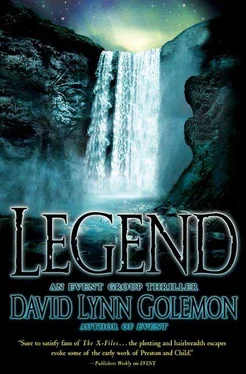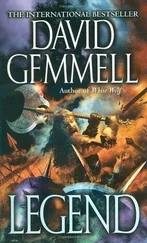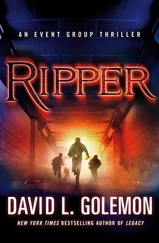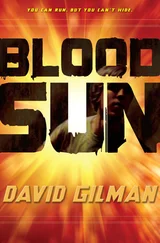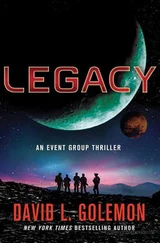Sarah's briefing was more to the point and actually had a purpose. Gold, if any, would not be touched. The mine, if it existed, would be placed off limits because of the fact that the president had ordered it so. The geology team would follow its orders to the letter. With the assistance of Major Collins and his security team, if the mine did contain any gold deposits as the legend said, it would be treated as property of Brazil.
"Major," Mendenhall said as he entered the ward room. "The Iwo 's helicopters are starting to line up and almost ready to start taking on Teacher ."
The helicopters would airlift the sections of the boat to the small village of Rio Feliz, on the Amazon a hundred miles west of the Peruvian border. That was where the Event Group would start its expedition, saving valuable time by flying through a gap in the Andes and going straight to the source, the confluence of the Rio Negro (the Black Tributary) that fed off the main Amazon River. The route was exactly as Captain Padilla had laid down on the map and also what he had supposedly described in the diary.
The president had supplemented information to both the Peruvian and Brazilian governments on the pretext that they were experimenting with new mapping procedures and software, and that the two governments would be the beneficiary of those experimental new devices and the more accurate underwater maps — a pretext that the team would be doing as routine procedure in any case.
It was an amazing sight to see the Seahawk helicopters, the navy's version of the Blackhawk, lined up in the air off the stern of the John C. Stennis. One by one they would approach and hover as Jenks supervised the hookup of the sections of Teacher . Eleven Seahawks in all would ferry the sections to the village where the parts would become a whole, and everyone prayed the thing would float. The discovery team was on deck as the last section, the bow, covered in form-fitting plastic, was lifted into the air. Then the last hovering craft came in and, in amazement, they watched as the U.S. Marine Corp's MV-22 Osprey, the stubby-winged, tilt-rotor assault craft, slowly landed on the Stennis 's flight deck, its two massive propellers making a humming sound from their perch atop the tip of the short wings. Before they realized it, a second Osprey landed in back of the first.
"I hate these things," Carl yelled into Danielle's ear.
"Why, because it's a radical design?" she asked, holding her bush hat in place through the wind the Ospreys created.
"No, it's because a marine pilot is driving that radical design!"
As they loaded their bags and personal items, Jack turned and looked at the flying bridge. There, the captain of the Stennis waved and saluted. Jack returned the gesture. The Stennis would stand off while the mission was in progress, in case they ran into trouble.
And so the third expedition was on its way to Hernando Padilla's valley, where a beautiful lagoon was ready to spill her secrets. What this group didn't know was the fact that another faction was already closing in on the legendary dark water.
THE AMAZON RIVER, 45 KILOMETERS EAST OF THE BLACK WATER TRIBUTARY
The helicopter had rendezvoused with Mendez, Farbeaux, and the crew of the charter boat Rio Madonna . Her captain had maneuvered the large tencabin river tug with precision, to receive the chopper's passengers. The first had been Captain Juan Rosolo, a man that Henri Farbeaux despised as an ambush killer of the lowest order, and the men that followed him onto the deck were probably no better. This development was most unsettling, but it was also one that Farbeaux had made allowances for.
Rosolo reported immediately to Mendez and the two had conversed in loud tones, enough so that Farbeaux knew Rosolo had failed his master in some capacity or other. Mendez, with all the delicateness of a wrecking ball, had spewed forth a list of his favorite profanities. Farbeaux was content to stay at the bow of the boat and keep out of it. He still heard the approach of Rosolo as the captain came forward after his browbeating by Mendez.
"What is it, watchdog?" Farbeaux said without turning to face the man.
"Do not call me that name, senor . My employer would like to see you at the stern," Rosolo said with a sneer.
Farbeaux watched the deep waters of the flowing Amazon for a moment longer before he turned and brushed past Rosolo.
The river pilot, Captain Ernesto Santos, gave a quick two-fingered salute to the Frenchman as he walked past the bridge. This captain seemed to know his business. His reputation and self-proclamation of knowing every inch of the Amazon were known to all onboard. He said he and his family had plied the river for generations.
But when their destination was finally revealed to him after they had set off, the scraggly bearded captain had grown quiet and sullen. He had protested in vain that the Rio Negro had no such inlet at that point of the river, that the only way in was several hundred kilometers to the east, and even that was only navigatable during the wet season. The argument didn't last long when he was presented with his overly large charter fee in cash.
Farbeaux maneuvered to the small fantail, where Mendez was waiting. Rosolo came up from behind and lightly brushed by him, obviously returning the gesture for Henri's brushing him a moment before. Farbeaux ignored Rosolo and sat at the small table where Mendez was examining some photographs.
"Ah, Henri, our friend here has brought with him from the States some rather disturbing news. As you know, we had Professor Zachary's office monitored. And we had some fish wander into our net." He slid a picture of Danielle toward Farbeaux. The Frenchman merely glanced at the picture, and then he looked at Mendez, who slid another eight-by-ten glossy toward him. "She was accompanied by this man," he said, watching him for a reaction. He wasn't disappointed; Farbeaux reached immediately for the second photo.
"The man in the tunnels," he said under his breath.
"Excuse me?" Mendez said, leaning forward.
Farbeaux stared at the picture for a moment longer and then let it fall to the table. "Last year I ran into this gentleman in an unusual situation in the American desert; I believe his name is Everett."
"Lieutenant Commander Carl Everett, of the U.S. Navy, to be more precise," Rosolo insisted. "I was unable to uncover his current duties or station, but it is a matter of closed naval records that he was once a SEAL, and a highly decorated one," he said, watching the tall Frenchman closely.
"I believe he is on detached service from the military. He works for what is best described as a think tank. The military is where the organization gets all of its security people, and they only surround themselves with the best." He turned his eyes toward Rosolo. "And you, watchdog, if you truly knew anything about the special operations units of the American navy, you would know that a man is never a former SEAL, he is a SEAL."
"Regardless of semantics, this is upsetting at the very least, is it not, Henri?" Mendez asked as he brought out more pictures and shoved them toward Farbeaux.
"These were taken at a national park in Montana. Do you recognize any of these people?" Rosolo probed.
Farbeaux looked the four photos over. They were grainy and taken from a distance with a telephoto lens through the glass windows of a vehicle.
"I have never seen these two before," he said. His eyes lingered on the close-up of Mendenhall. "But this one here," he slid a photo of the black sergeant back toward Mendez, "may work with the SEAL, Everett."
"Then the puzzle fits together. Our friend Senor Rosolo overheard a conversation Everett had with a second party on a secured and scrambled phone, that these people would be in Montana searching for the map of Padilla. To make a long story short, Rosolo attempted to stop them from recovering something that would lead them here and, I am sorry to say, he failed miserably, only managing to kill two federal park employees. And he was still unable to recover or destroy the map." Mendez's eyes looked directly at his assassin.
Читать дальше
